Sports media experts complain about Nielsen's measurement practices

The GIST: The math’s not mathing when it comes to viewership numbers. According to a Friday report, sports media experts recently convened for a three-hour, closed-door meeting to discuss broadcast audience measurement following complaints about Nielsen’s practices.
The details: Disney Advertising facilitated the Nielsen-hosted gathering, which was attended by execs from NBCUniversal, Paramount, Fox, Amazon, Google, Apple, the NFL, NBA and NHL. Agency reps from Omnicom Media Group, Publicis Media and GroupM also made an appearance.
- Agenda items included consistency and transparency across media companies, evaluating co-viewing and out-of-home audiences and Nielsen One, the company’s new cross-platform measurement offering.
The context: Nielsen’s numbers have been vastly different from competitors like iSpot.tv recently, especially for the NFL. For example, Nielsen’s measurements differed 0.4% for this year’s AFC Championship and 13.5% for the NFC version. Flag on the play.
- The discrepancy may stem from out-of-home audiences which are hard (and pricey) to measure — commercial venues don’t always provide numbers to cable companies, and streamers’ licensing deals restrict automated data.
- For some, measuring those audiences isn’t worth it. Viewers at bars and restaurants often can’t hear commercials (and may not even be watching), and advertisers usually pay discounted prices to access out-of-home crowds.
Zooming out: Viewership numbers are foundational to assigning monetary value to available sports inventory, so the importance of correct stats can’t be understated. It’s especially critical for rising properties like women’s sports leagues as they continue to earn new valuations on the back of audience growth.
- Renewed criticism of Nielsen’s measurements may also usher in new ad spend trends that favor digital platforms, where measuring audience engagement and demographics is much easier. The times they are a-changin’.
Enjoying this article? Want more?

Sign up for The GIST and receive the latest women's sports business news straight to your inbox three times a week

